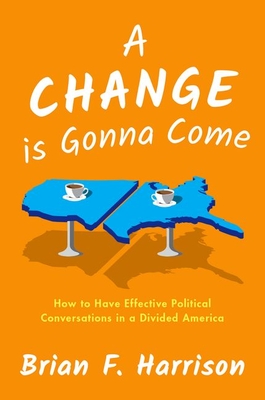 A Change is Gonna Come: How to Have Effective
A Change is Gonna Come: How to Have Effective
Political Conversations in a Divided America
by Brian F. Harrison
Oxford University Press. 208 pages, $23.79
THERE COULDN’T be a better time for Brian Harrison’s A Change is Gonna Come than now, a presidential election year in a time of crisis when, far from pulling together as we have in past crises, the country is more polarized than ever. Even though there’s no mention of the current administration in Washington, it seems fairly obvious that the Trump-Pence regime provided much of Harrison’s inspiration.
The author, whose doctorate is in political science with a specialty in American politics, is a lecturer at the Humphrey School of Public Affairs at the University of Minnesota. He is the founder and president of Voters for Equality. Now a proud progressive, Harrison grew up with conservative parents and served in a Republican administration—experiences that provided important insights on how to communicate with people who hold divergent political views.
Harrison tackles the project that’s contained in his subtitle by proposing some explanations for the vast division of political perspectives. He argues for the importance of understanding the basis of one’s own views and emotions before reacting and criticizing others’, and uses sociological and psychological research to support his arguments. For example, he discusses Robert Plutchik’s psycho-evolutionary theory of emotion, a classification of what he considers the eight primary emotions and their polar opposites, such as joy versus sadness, trust versus fear, which are represented on a wheel. He also uses priming theory, which “suggests that communicators can alter the criteria for evaluation—context, images, and cues—that they use when forming an opinion,” and consequently alter the way they present their side. For example, priming a common identity increases the likelihood of in-group cohesion. He also takes on such hot-button issues as LGBT rights, healthcare, and the Affordable Care Act to illustrate his thesis.
The aim of this book is to increase readers’ empathy for others’ viewpoints and to give them some strategies with which to reduce the anxiety, disgust, and anger that often manifest themselves in political dialogue. It also encourages us to engage in positive and perhaps even productive conversations with people with whom we disagree. That said, if you’re hoping to be able to persuade your mother or father, uncle or aunt, to change their mind, you will probably end up being disappointed. Nor is Harrison’s message simply one of “Let’s just agree to disagree.” The aim should be to work toward some shared goals or operating principles that you can agree on as a place to land on before launching a discussion about the means to an end, which is where the disagreements tend to arise.







Discussion1 Comment
Thanks very much, Stephen, for the great review! I hope it will spark meaningful discussions and will bring to light all the lessons the LGBTQ advocacy of the last 40 years has taught American culture writ large.